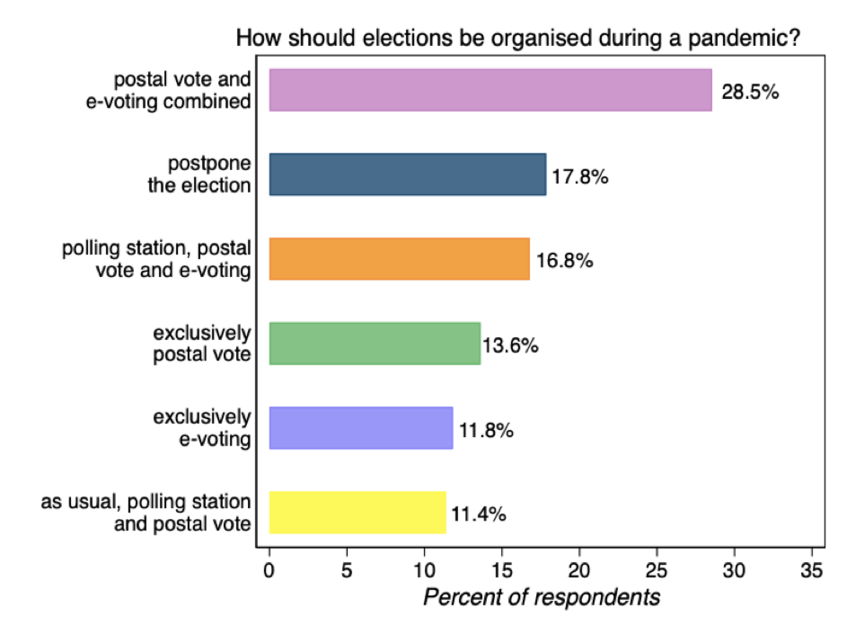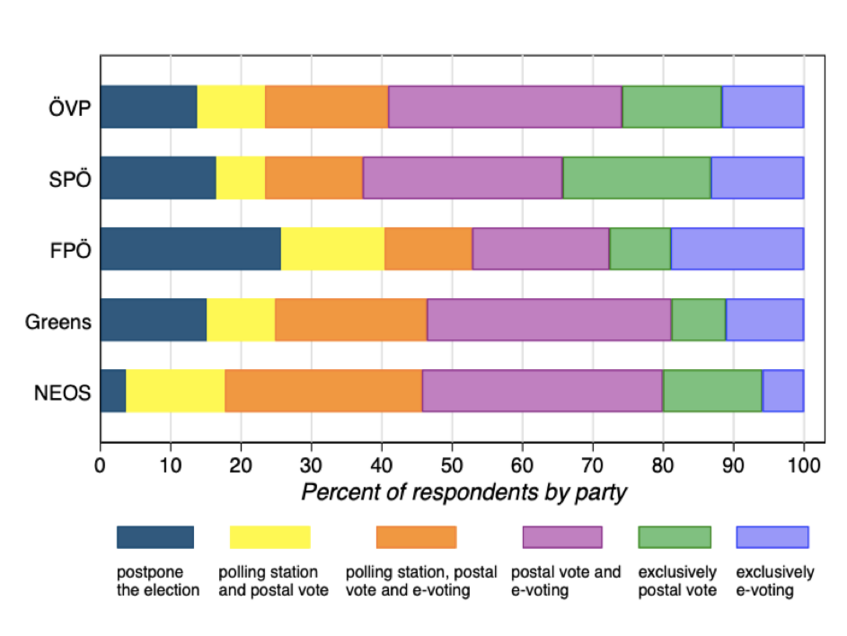14.05.2020
Should elections be held during a pandemic and if so, how? The attitudes of Austrians towards e-voting
- The majority of the Austrian population appears to prefer holding elections over postponing them even during a pandemic.
- Most would prefer to vote either by postal vote and/or online by e-voting.
- However, whether and how elections should be organised depends on the party preference of the respondents. In particular, FPÖ voters prefer a postponement of elections more often than voters of other parties.
By Carolina Plescia, Sylvia Kritzinger und Julia Partheymüller
Regular, free and fair elections are the central element of a democracy. The Corona Pandemic poses a huge challenge to holding elections for several reasons: voter turnout may drop because voting at the polling station may be seen as a problem for some voters concerned about health; public campaigns may not be able to be held; and the health of election workers may be at risk. At the same time, postponing elections also carries its risks. Last but not least, the right to vote and to be elected is a fundamental principle of liberal democracy. Postponing elections - to an indefinite or distant date - thus raises fundamental concerns about fundamental rights and the legitimacy of political authority.
Different countries have chosen different solutions for holding elections during the Corona crisis (for an overview see the report by ElectionWatch.EU). For example, France still held the first round of the local elections on 15 March 2020 following the usual procedures. However, health concerns and a very low voter turnout led to a postponement of the second election round - the run-off. Similarly, the first round of the local elections in Bavaria, also on 15 March 2020, was held as usual with the possibility of voting at the polling station, but the rules for the second round were changed in such a way that only postal voting was possible. In countries such as Austria, Italy, Poland or Spain, however, planned elections were postponed. In Austria, for instance, the local elections in Vorarlberg and Styria were postponed. The possibility and need of postponing the election has also been discussed in relation to the upcoming Vienna elections in autumn 2020. Against this background, our blog post explores the following question: What does the Austrian population think about holding elections during a pandemic? And are there differences between voters of the different parties?
How should elections be organised during a pandemic?
In wave 5 (24-29 April 2020) of the Austrian Corona Panel we asked respondents about their attitudes with regards to holding elections during a pandemic. Of the six different answering options listed in Figure 1, which capture whether and how elections should be organised, the most frequently chosen option is that elections during a pandemic should be organised by a combination of postal voting and e-voting (approx. 28% of respondents). The second most frequently chosen answer is to postpone the election (18%), followed by the option to allow voting simultaneously at the polling station, by e-voting and by absentee voting (17%). About 14% of respondents prefer the option of voting exclusively by postal vote, while roughly 12% would support voting exclusively online via e-voting. It is interesting to note that the least frequently chosen option is the status quo - namely to hold elections at the polling station with the option of postal voting (11%).
Since our survey is an online survey, the percentage of those who actually support online voting may be somewhat overestimated. However, it is clear that only a minority of respondents are in favour of postponing the election. The majority of respondents are in favour of holding elections during a pandemic, but with the option of voting "remotely", i.e. either by postal vote or e-voting.
This positive attitude towards "remote" voting is remarkable, as our data also show that respondents generally consider e-voting or postal voting to be less secure. The risk of fraud is estimated to be higher for e-voting and postal voting than for voting at the polling station (see Figure A1 in the Appendix). It is therefore interesting to note that a majority of Austrians would nevertheless prefer a "remote" vote over postponing the elections. We can only speculate about the reasons, but perhaps voting at the polling station during a pandemic is associated with too high health risks - so that even voting modes perceived as less secure are preferred.

Figure 1: Preferences about how elections should be organized during a pandemic (Data: Austrian Corona Panel Data, wave 5, 24-29 April 2020; weighted; N=1,445). 70 respondents expressed no opinion (N=1,515).
What do the voters of different parties think?
There are significant differences in the attitudes of supporters of different parties towards holding elections during a pandemic and about the election mode (see Figure 2). Voters of the christian-democratic ÖVP, the social-democratic SPÖ, the Greens and the liberal NEOS would prefer to vote by postal vote and/or e-voting, whereas populist-right FPÖ voters most often prefer to postpone elections. The share of FPÖ voters who would like to postpone the elections is 26.7%; for voters of the ÖVP it is 13.8%, for the SPÖ 16.4% and for the Greens 15.2%, while only very few NEOS voters (about 4%) are in favour of postponing the election. Party supporters also differ in their assessment of the risk of fraud in e-voting and postal voting, with FPÖ voters seeing the highest risk of fraud with these two modes of voting (see Figure A2-4 in the Appendix).

Figure 2: Preferences about how elections should be organized during a pandemic by party vote at the Austrian national election 2019 (data: Austrian Corona Panel Data, wave 5, 24-29 April 2020; weighted; N(valid cases)= 967)
Summary and conclusion
Various factors must be taken into account when deciding whether and how elections should be held during a pandemic. In this blog, we investigated the attitude of the Austrian population with regard to the questions of whether elections should be held, and if so how. Opinions are mixed, but a majority of the population would support holding elections, especially in the form of remote voting by postal vote and/or e-voting. However, this is less often the case for FPÖ voters who are more likely to prefer to postpone the elections in times of a pandemic and who fear a higher risk of fraud in e-voting and postal voting than other voters. For the democratic legitimacy of elections and the confidence in the electoral process it would be desirable that decisions on changes of the electoral modes are equally supported by all parties and a majority of voters. Our results show that there may still be some hurdles on the way to a consensus on changing election rules in Austria. While the constitutional judges will ultimately decide on which mode of voting in elections - and especially on whether e-voting - is constitutional, the question of the mode of voting in elections is also a political decision: because holding elections via the additional option of e-voting also requires that the political actors win the support and trust of most citizens for this form of voting.
Carolina Plescia is an Assistant Professor in the Department for Political and Social Sciences at the University of Bologna and in the Department of Government at the University of Vienna. She holds a PhD from Trinity College Dublin and conducts research on topics such as public opinion, election campaigning and party politics.
Sylvia Kritzinger is Professor of Methods in the Social Sciences at the Department of Government at the University of Vienna. She is deputy director of the Vienna Center for Electoral Research (VieCER) and one of the project leaders of the Austrian National Election Study (AUTNES). Her research focuses on political behavior, electoral research, democratic representation, political participation and quantitative methods.
Julia Partheymüller works as Senior Scientist at the Vienna Center for Electoral Research (VieCER) at the University of Vienna and is a member of the project team of the Austrian National Election Study (AUTNES). She received her doctorate in social sciences at the University of Mannheim and studied political science at the Free University of Berlin and the University of Hamburg.
